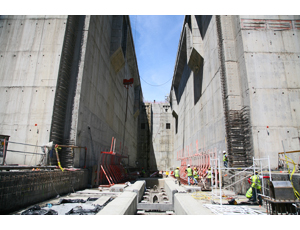
The $5.2-billion expansion of the Panama Canal came to a halt on Feb. 5 after negotiations between the contractor and the project owner over cost overruns broke down late the night before.
Grupo Unidos por El Canal (GUPC), a consortium led by Spanish construction firm Sacyr Vallehermoso S.A., turned away thousands of workers on the third set of locks and told them to return home.
GUPC had set a deadline of Feb. 4 to stop work if owner Panama Canal Authority (ACP) would not agree to pay for a reported $1.63 billion in cost overruns.
In a statement, the authority "demanded" that GUPC resume work on the project as required by the contract but said it "continues to keep the door open."
However, Panama Canal Administrator Jorge Quijano said at a Feb. 5 briefing that the authority has the financial resources to complete the expansion project and was prepared to implement a "Plan B" to see the project through.
"The Panama Canal is not going to submit to blackmail," Quijano said.
The contractor alleges the agency is responsible for the cost increases because it provided faulty information about conditions of the job, particularly the quality of site aggregate for the 5 million cu meters of concrete needed for locks construction.
“The GUPC investors are construction companies, not banks. It is unjust and impossible for the ACP and Panama to expect that private companies will finance $1.6 billion in costs on a project that was to be fully funded by the ACP,” said the contractor consortium in a statement.
But Quijano said at the briefing that recent negotiations had stalled since the contractor would not back down from its "inflexible position."
He warned that the window to reach an agreement was “closing minute by minute” and noted that the authority had the right to rescind the contract with GUPC at any time.
The contractor group also includes Italy's Impregilo S.p.A., the Netherlands' Jan De Nul n.v. and Panama's Constructora Urbana S.A.
The consortium's $3.12-billion bid, the only one below the ACP's allocated $3.48-billion cost, bested the next-lowest bid by the Bechtel-Taisei Mitsubishi team by more than $1 billion.
“We have a project with problems and we have to resolve them,” Quijano said. “We are not going to permit the [expansion] works to be delayed an excessive period.”
The project had been set for a mid-2015 completion, which Quijano emphasized at the briefing would hold.
While GUPC warned that the work stoppage would result in the ACP facing "years of disputes," Sacyr President Manuel Manrique suggested in a Feb. 5 interview that the impasse between the two sides may be surmountable.
"Negotiations are not definitely broken," he said. "Unfortunately we have not achieved the common goal."
The canal authority argues the contractor must follow a three-step, dispute-settlement process to resolve nearly $1.4 billion in cost disputes, filed in 13 claims.
A few have been resolved but most are still in process.
The expansion project is more than 70% complete. To date, GUPC has been paid $2.83 billion by the canal authority. It also has paid the consortium an additional $180 million for cost overruns.
According to ACP officials, the relationship with GUPC has deteriorated significantly over the past year but escalated in December in an exchange of letters between the owner and contractor related to a threatened project shutdown over the disputed costs.
Both sides have been negotiating the matter since early January.
Zurich Insurance Group, which holds $600 million in bonds related to the project, has also been part of the talks. The firm has not commented on the dispute or the talks.


Post a comment to this article
Report Abusive Comment